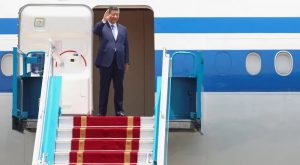Russia has retained broad access to computer chips from the West despite sanctions imposed after it invaded Ukraine, via imports from China and other neighbouring countries, a new report has found.
The report, written by chip expert Chris Miller for the American Enterprise Institute, said that while sanctions had disrupted Russia’s ability to import chips directly from the West and hobbled its ability to make more chips, it had turned to new suppliers.
“China is by far the most important source of chips for Russia,” it said, adding that “in the first half of 2023, shipments from China accounted for 88% of the chips Russia acquired, measured by dollar value.”
ALSO SEE: Row Over Fair Car Trade Continues as Scholz Lands in China
“Such transactions are usually illegal under US law, but the Chinese government has turned a blind eye to this trade,” the report said.
“In an early February 2024 meeting, Chinese President Xi Jinping and Russian President Vladimir Putin promised to ‘maintain the stability’ of industrial trade, referring to China’s supply of critical components to Russia’s defence industrial base,” it said.
Russia has also enjoyed a “dramatic increase” in chips from “neighbouring countries that lack chip industries”, such as Turkey and countries in the South Caucasus and Central Asia, which Russia had scarcely imported any semiconductors from before.
Even the Maldives, an island chain in the Indian Ocean, which has no chip industry, was found to be the source of $53 million worth of chip shipments after the opening of “direct Aeroflot flights between the Maldives and Moscow,” it said, citing journalists at Nikkei Asia.
Nevertheless, sanctions imposed by the US, the European Union, and respected by chipmaking companies in Japan, Taiwan and elsewhere, had made these imports much more expensive – increasing costs by about 80%, the report said.
Western sanctions had caused substantial supply-chain issues and price increases, with successive rounds of sanctions forcing Moscow to pay “nearly twice as much for semiconductors as it did before the war.”
Chip smuggling like a game of ‘whack-a-mole’
Miller said Ukrainians had captured many types of Russian military equipment – missiles, drones, plus communication and intelligence equipment – which showed Moscow’s extensive reliance on Western chips.
But fully cutting off Russia’s access to chips was impossible because the world produces over a trillion chips a year, and they are small enough to fit hundreds in a single suitcase.
Russia had been forced to repeatedly establish new supply chains for acquiring chips. As sanctions disrupted existing smuggling routes, it had set up new ones, likening these outcomes to a game of “whack-a-mole”, that was frustrating for both Western governments as well as “supply-chain managers at Russian missile and drone factories”.
But it said: “The biggest failure in enforcing the controls is not that Russia continues to have some success in smuggling — that’s not a surprise — but that China continues shamelessly to sell Russia so much via normal trade routes.
“The Biden administration and European allies have thus far been unwilling to devote political capital to push China to even partially abide by Western restrictions.
“So long as China sells Western chips to Russia, the US should impose more frequent sanctions against Russian and Chinese firms involved in the illegal chip trade, with the aim of enhancing the disruptive effect.
“Russia cannot be fully cut off from access to chips, but the existing controls are probably already causing bottlenecks in Russian defence production. Ramping up enforcement will intensify this effect.”
Israel shipping chipmaking tech
Some old chipmaking machines had also been imported from South Korea, Taiwan and Israel. The latter had sent at least 30 shipments of chipmaking tech, but was not participating in sanctions on Russia, he said.
The imposition of new sanctions reduced chip shipments even when the trade was exclusively between Russian and Chinese firms, he said, adding that “if the US listed more companies more frequently, it would cause more disruption to Russia’s defence supply chains”, as the local sector is “still highly reliant on parts from the West.”
The report recommended that distributors and secondary marketplaces should be pressed to comply with sanctions and penalized for facilitating shipments that raise concerns.
- Jim Pollard
ALSO SEE:
US Lawmakers’ Fury Over Huawei’s Intel AI Chip-Powered Laptop
China Orders Telecoms to End Use of US Chips by 2027 – WSJ
Taiwanese Firms Eye SE Asia Boltholes in Case China Invades – FT
Four Chinese Firms Blacklisted for Seeking AI Chips for Military
Dutch May Give in to US Push Against Servicing China Chip Tools
China’s Retaliatory Bans Could Cost US Tech Giants Billions
Beijing’s Push to Dump Foreign Tech on Display at China Chip Fair
China’s SMIC May Have Breached US Curbs With Huawei Chip
Global Chip Sector ‘Can Never Return to its Pre-Covid Set-up’
China-Russia Trade Booms as War Forces Moscow to Look East
























